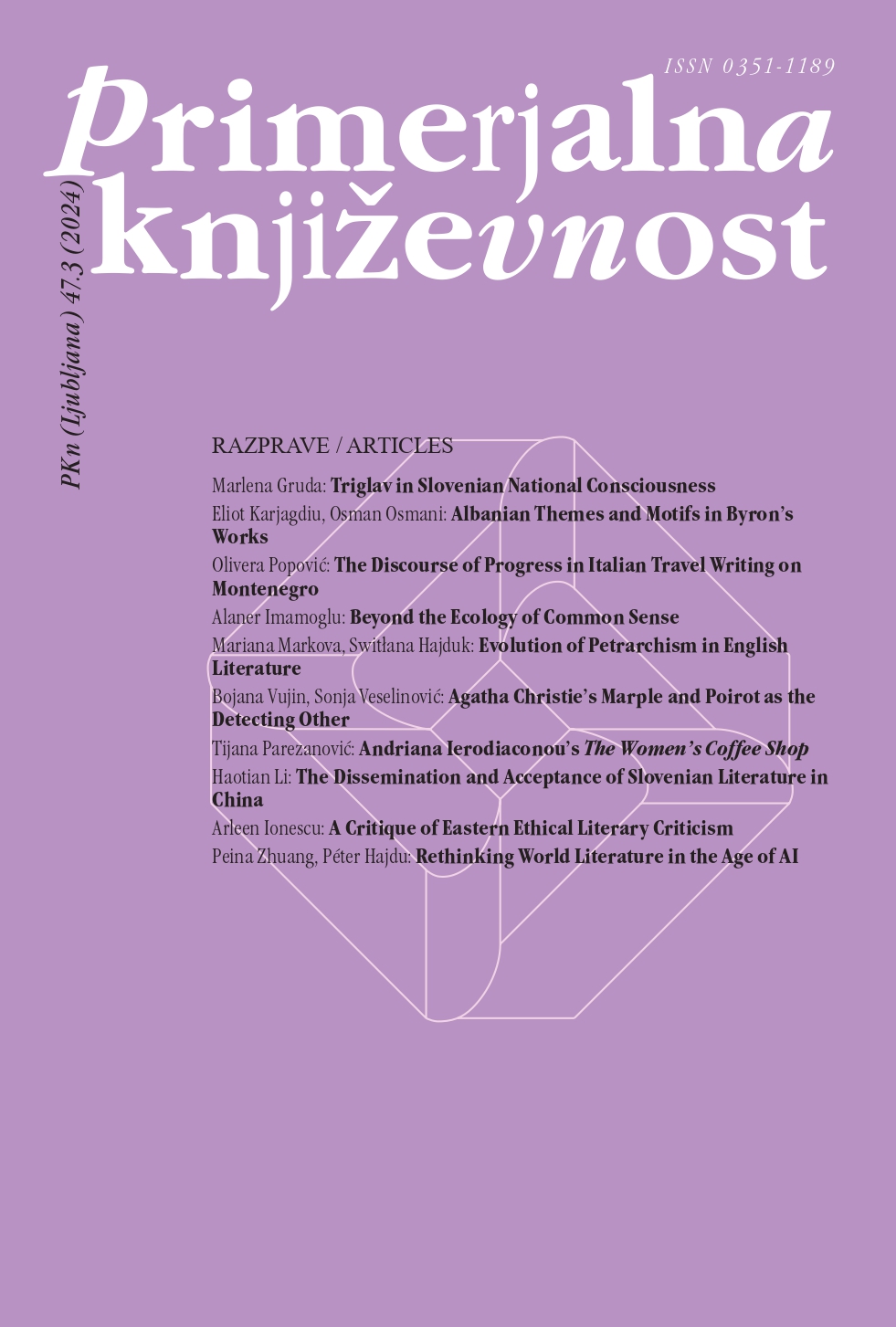Rethinking World Literature in the Age of AI
DOI:
https://doi.org/10.3986/pkn.v47.i3.10Keywords:
literature and AI, AI-generated poetry, translation, literariness, ChatGPT, Lem, StanisławAbstract
The debate about world literature has never stopped since the term was first introduced in a conversation between Goethe and his secretary almost two centuries ago, and it has intensified in the age of AI, which is bringing about changes in almost every aspect of society, including world literature. Specifically, while AI brings enormous benefits to the dissemination and translation of world literature, it also creates challenges and problems. Based on the analysis of the translation of literary texts across different cultures, this paper argues firstly that AI may contradict David Damrosch’s claim that “world literature gains through translation,” as world literature can in fact “lose” something, e.g., literariness, as the examples selected in this paper show, and secondly that AI can also provide a “biased” picture of theories or works from different cultures. We should therefore be wary of these two risks, otherwise we could be misled in this “technological wave.”
References
Benjamin, Walter. “The Translator’s Task.” Translated by Steven Rendall. TTR, vol. 10, no. 2, 1997, pp. 151–165.
Brown, Marshall. “Encountering the World.” Neohelicon, vol. 38, no. 2, 2011, pp. 349–365.
Calvino, Italo. Una pietra sopra: discorsi di letteratura e società. Turin, Einaudi, 1980.
Cheah, Pheng. What Is a World? On Postcolonial Literature as World Literature. Duke University Press, 2016.
Damrosch, David. What Is World Literature? Princeton University Press, 2003.
Duhan, Alice, et al., editors. Literature and the Work of Universality. De Gruyter, 2024.
Frost, Robert. “Spring Pools.” Poem Hunter, 3 Jan. 2003, https://www.poemhunter.com/poem/spring-pools/.
Gadamer, Hans-Georg. Truth and Method. Translated by Joel Weinsheimer and Donald G. Marshall, Continuum, 2004.
Hayot, Eric. On Literary Worlds. Oxford University Press, 2012.
He, Jing. “ChatGPT时代,翻译如何创造新的语言和新的文学?” (“How to Create a New Language and Literature by Translation in the Age of ChatGPT?”). Wenxue Bao, 30 Mar. 2023, p. 2.
Heidegger, Martin. Basic Writings: From Being and Time (1927) to The Task of Thinking (1964). Edited by David Farrell Krell, HarperCollins, 1993.
Jameson, Fredric. The Cultural Turn: Selected Writings on the Postmodern, 1983–1998. Verso, 1998.
Juvan, Marko. “Wordliness, Worlds, and Worlding of Literature.” Metacritic Journal for Comparative Studies and Theory, vol. 8, no. 1, 2022, pp. 5–22.
Lem, Stanisław. Cyberiada. Krakow, Wydawnictwo Literackie, 2002.
Lem, Stanisław. The Cyberiad: Fables for the Cybernetic Age. Translated by Michael Kandel, Seabury Press, 1974.
Lem, Stanisław. Kiberiáda. Translated by Beatrix Murányi, Budapest, Európa, 1971.
Li, Yingjun. “机器翻译与翻译技术研究的现状与展望: 伯纳德·马克·沙特尔沃 思访谈录” (“The Present and Future of Machine Translation and Translation Technology: An Interview with Dr. Mark Shuttleworth”). Chinese Science and Technology Translators Journal, no. 1, 2014, pp. 24–27.
Moretti, Franco. “Conjectures on World Literature.” New Left Review, no. 1, 2000, pp. 54–68.
Ricoeur, Paul. The Rule of Metaphor: Multi-Disciplinary Studies of the Creation of Meaning in Language. Translated by Robert Czerny et al., Routledge and Kegan Paul, 1986.
Saussy, Haun. “The Dimensionality of World Literature.” Neohelicon, vol. 38, no. 2, 2011, pp. 289–294.
Schleiermacher, Friedrich. Hermeneutics and Criticism and Other Writings. Edited by Andrew Bowie, Cambridge University Press, 1998.
Shklovsky, Viktor. “Art as Technique.” Russian Formalist Criticism: Four Essays, edited and translated by Lee T. Lemon and Marion J. Reis, University of Nebraska Press, 1965, pp. 3–24.
Spivak, Gayatri Chakravorty. “Three Women’s Texts and a Critique of Imperialism.” Critical Inquiry, vol. 12, no. 1, 1985, pp. 243–261.
St. Vincent Millay, Edna. “Spring.” Poetry Foundation, 13 Apr. 2017, https://www.poetryfoundation.org/poems/44728/spring-56d223f01f86e.
Ursa, Mihaela. “Universality as Invariability in Comparative Literature: Towards an Integrative Theory of Cultural Contact.” Primerjalna književnost, vol. 37, no. 3, 2014, pp. 151–163.
Wang, Huashu. “国家翻译技术能力研究:概念内涵、要素分析和主要特征” (“National Translation Technology Capacity: Concept, Elements and Main Features”). Chinese Translators Journal, no. 2, 2023, pp. 35–43.
Wang, Ning. “‘Weltliteratur’: From a Utopian Imagination to Diversified Forms of World Literatures.” Neohelicon, vol. 38, no. 2, 2011, pp. 295–306.
Wang, Ning. “世界文学与翻译” (“World Literature and Translation”). Literature and Art Studies, no. 3, 2009, pp. 23–31.
Zhang, Sheng. “亚里士多德的梦魇与萨特的愤怒” (“Aristotle’s Nightmare and Sartre’s Fury: The Impact of ChatGPT on Literary Creation”). Studies in Culture and Art, no. 3, 2023, pp. 44–48.
Zhang, Yingying. “人工智能时代, 技术和人文应相互照亮” (“The Mutual Illumination of Technology and Humanities in the Era of Artificial Intelligence”). Wenxue Bao, 18 June 2023, p. 1.
Zong, Baihua. 宗白华全集 (第2卷) (A Complete Anthology of Zong Baihua, Vol. 2). Hefei, Anhui Education Press, 2008.


